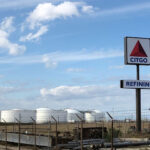Crestone Peak sues Town of Erie to overturn new odor ordinance
As oil and gas drilling gets closer to communities, residents are compelling elected leaders to set limits, using land-use and zoning codes to control industrial operations
From the Longmont Times-Call
Crestone Peak Resources filed a lawsuit Thursday in Weld County seeking to have Erie’s newly enacted odor ordinance ruled unconstitutional.
The Denver-based oil and gas company was served its first violation of the code in early November, nearly two months after multiple residents complained of a diesel smell at the Pratt well pad.
“We’re seeking to have the court declare the ordinance unconstitutional, as the vague language on unquantifiable levels of odor makes ongoing compliance and enforcement impossible,” Crestone spokesman Jason Oates said. “The ordinance also is at odds with our legal right to work while in compliance with state regulations and within the requirements of our local operating agreement.”
The code approved in July by the Erie Board of Trustees makes it “unlawful and a public nuisance for any person, tenant, occupant or property owner to permit the emission of odor from any source to result in detectable odors that leave the premises and are detected by a reasonably prudent person with a normal sense of smell,” according to town documents.
In the lawsuit, Crestone alleges the ordinance is plainly directed at the company since a portion of residents have vocally opposed its oil and gas operations. Crestone operates about 200 wells in Erie, which is in both Boulder and Weld counties.
Fed-up Colorado Towns Fight Oil and Gas Ops by Making New Rules
At least four towns are ready to go to the mat to control how industry operates within their boundaries
From the Denver Post Aug. 24, 2017
Colorado residents fed up with what they see as the state’s failure to protect people and the environment are fighting fossil-fuel development inside their towns by making new rules requiring odor control, bigger setbacks and company disclosure of underground oil and gas flowlines.
But the industry and state government are ready to fight back.
An odor-control measure in Erie, letting police hit companies with tickets for foul fumes, takes effect next week.
Erie, Broomfield, Thornton and Lafayette are each developing map submission rules, with leaders saying the fatal April 17 house explosion in Firestone makes this a no-brainer. Broomfield residents also will vote on whether to change their charter to require protection of health, safety and the environment as preconditions before drilling inside city limits can be done.
“We have statutory authority over land use,” Erie trustee Mark Gruber said. “All we’re asking the industry to do is what we ask everyone else to do in our town: Show us what you’re going to build. Just tell us what is underneath the ground. How does that impact your operations?
“What is happening in this state, especially in southwest Weld County, is that municipalities are having to pass ordinances based on legal positions that they believe are firm — with the knowledge that the Colorado Oil and Gas Association or the Colorado Oil and Gas Conservation Commission will take them to court. It seems like anything anybody tries to do at the local level ends up in the Supreme Court of Colorado. That’s not a cooperative, partnering environment.”
Oil and gas industry leaders Wednesday acknowledged more lawsuits are likely.
“The odor ordinance? We will see how that is applied in Erie,” COGA president Dan Haley said in an interview at a fossil-fuels energy summit in Denver. “It clearly was an effort to go after oil and gas. It will have broader impacts if it is applied aggressively.”
And Thornton’s latest 750-feet setback and flowline-removal rule, Haley said, is a case where “you have a City Council passing illegal regulations after a very limited stakeholder process.”
Gov. John Hickenlooper announced Tuesday that an existing 811 notification system will be used to give site-specific underground flowline information to residents, planners and builders — instead of a public website. COGA favors that approach because pipeline information quickly becomes outdated as new lines are installed, Haley said. Industry leaders and Hickenlooper invoked the potential for terrorism or monkey-wrenching, too, should flow line network maps be made public.
“There were concerns among some in the industry about putting out a road map of where all of our infrastructure is in a world where people have threatened — and, in some cases, have damaged or committed illegal acts against — our infrastructure,” Haley said.
The residents in Broomfield participated in lengthy discussions with Extraction Oil and Gas that led to adjusted plans to drill multiple wells before seeking a state permit. Yet Broomfield leaders still were preparing this week for a vote to change the city and county charter to make protecting health, safety and the environment a priority – in line with the recent Martinez case ruling by the Colorado Court of Appeals. “(Residents) are keying off the Martinez decision,” Broomfield county attorney William Tuthill said.
“That initiative (in Broomfield) is pure scare tactics, and it will be challenged at some level” by COGA, COGCC or others, Haley said.
“Oil and gas is where it is. It has been there a long time. It does not respect municipal boundaries. And while locals certainly have control over land use and some surface issues, it is best because oil and gas is of statewide interest that the state is the regulator of this industry,” he said. “If you create this patchwork of rules, you will cause millions of dollars of investment to go elsewhere.”
But Lafayette mayor Christine Berg bristled at “loopholes” favoring oil and gas companies and said locals must be able to protect health, safety and the environment within urban boundaries.
“We are putting something on our books saying we want to know where the flowlines are. The city does not have a good sense of where the existing lines are,” Berg said. “This is within our purview. We have fought before. We are not averse to working through the judicial system.
“What has happened is that local control issues have not made it onto a statewide ballot. And we haven’t gotten traction with state lawmakers. This is what the communities want.”
Not only are industry groups prepared to challenge local rules they see as restrictive, but state COGCC officials are asking the state Supreme Court to review and reject the Martinez decision. State Supreme Court rulings already have buttressed COGCC power by striking down moratoriums and bans on drilling inside municipal limits such as those attempted by Longmont and Fort Collins.
But as oil and gas drilling gets closer to communities, the more Front Range residents are compelling elected leaders to set limits, using land-use and zoning codes to control industrial operations.
“What is the concern? It is citizens who are concerned about the drilling activity and everything related to it that is affecting their daily lives,” said Colorado Municipal League executive director Sam Mamet, who has consulted with Hickenlooper on navigating state-local tensions. “The mapping issue, sadly, has been brought to the forefront because of Firestone. The state, as well as local governments, are driven primarily by one fact only: Nobody wants to see this tragedy happen again.”
Colorado lawmakers have failed to address concerns about underground pipelines. Legislation that would have required oil and gas companies to disclose the location of each flowline, gathering pipeline, and transmission pipeline to the COGCC director and local governments where pipelines exist, putting information out on public website with a searchable database faced industry opposition. It died.
As oil and gas companies close in on communities, they face a rapidly growing population, including owners of new homes who are determined to do anything to save their quality of life.
Erie residents filed more than 119 complaints about odors from drilling near homes before compelling local leaders to respond.
“You are sitting out on your patio and – whoof – it is like you are at a truck stop. And it is causing respiratory problems,” said Monica Korber, 57, part of a group that is pushing for the mapping requirement. “I’ve never had asthma before. Now I have asthma.”
She carries an inhaler and said she is hoping local police will protect residents where state officials have not. Obtaining maps of underground pipelines is crucial to prevent worse harm, she said.
“We’d simply like to know what we’d possibly be exposed to if there are leaks, and we don’t want to be another Firestone,” she said. “There’s going to be more construction around here, and knowing where the lines run will be important when they start building.”
When residents complained, the Colorado Department of Public Health and Environment investigated, determining that fumes from drilling could be the cause of respiratory problems but that chemicals did not exceed limits.
CDPHE’s investigation concluded that the chemicals in the air “were well below health guideline levels” but were “detectable” as an odor. The fumes were consistent with those that come from “diesel-based drilling fluid used” on a local drilling site. And based on health concerns reported by residents and documented odors, “it is clear that some individuals have experienced physical symptoms related to odors from the site.” CDPHE officials acknowledged “there may be other chemicals that were not measured that may contribute to the respiratory irritation and odor concerns reported by residents.”
COGCC regulators also responded and have “put additional monitoring measures in place in the area where these complaints are focused,” agency spokesman Todd Hartman said in an email. These include driving and foot patrols by inspectors.
“COGCC has in a few instances detected off-site odors,” Hartman wrote.
But those state responses didn’t quell the conflict as drilling operations inside Erie continue.
“(People are digging in) to control it any way we can. We’re using any measure that could possibly be enforceable,” Korber said. “We cannot just tell them to pack their bags and leave. That is unfortunate.”






